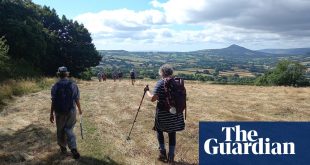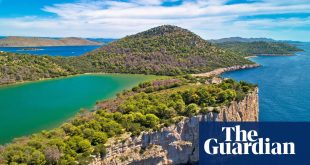A gleaming adventure playground where smaller visitors can hurl themselves down a super-size coal chute. Gentle shire horses. An old-fashioned sweet shop… Blists Hill Victorian town, the open-air museum in Shropshire, easily captures my sons’ attention, but it’s a different exhibit that makes me pause. In a hangar-like space I spot the beefy black hull of the Spry. The only complete surviving Severn trow – these distinctive barges once shuttled stone, coal and iron downriver to Cardiff and Bristol, and in shallow waters were hauled back up with ropes. It’s a vivid reminder of what this stretch of the Severn might have looked like 150 years ago, when up to 70 boats a day worked this riverine route.
If the Spry has magicked me back to Victorian times, however, I am about to rewind much further. Before the Industrial Revolution – and, in many cases, long afterwards – local people crossed, and fished from, the river by coracle. These little round boats, traditionally made for just one person from foraged wood and a cow or bull hide, were used for everything from poaching to ferrying goods during floods. In a nod to this more rural heritage, Shropshire Raft Tours plans to start hiring out coracles on the river from Easter, and my boys and I are in Ironbridge to test them out.
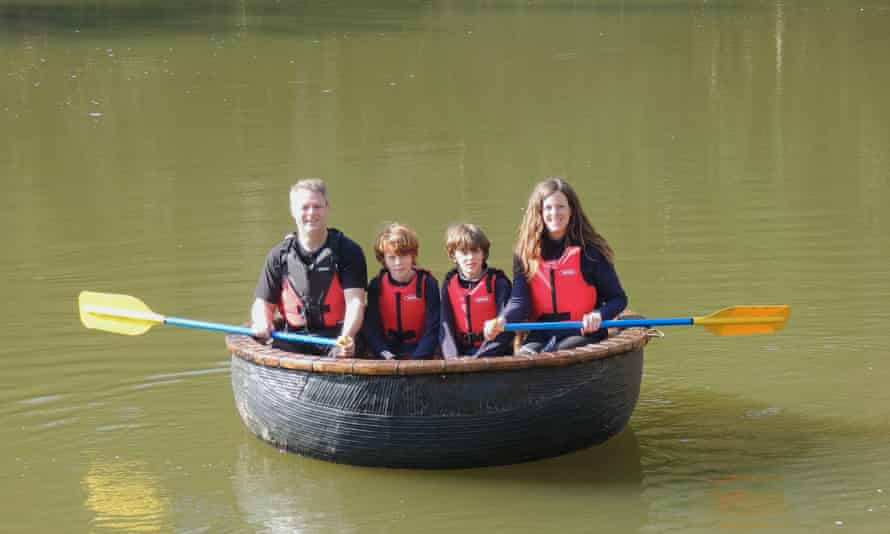
Waiting for us on a little gravel beach by the town’s Museum of the Gorge is Nigel, our guide, and what looks like a giant bread basket. While Nigel holds the coracle, we all clamber in and perch on the wooden bench inside, admiring the boat’s finely woven bamboo form. “We were looking for something new to offer,” he says, hopping in and pushing off from the bank. “We wanted an experience that a whole family could do together and feel really stable.”
On a sunny spring morning, months after the winter floods have subsided, it certainly feels stable. These larger coracles are rowed with a standard kayak or SUP stroke rather than the figure-of-eight movement traditional coraclers use, and as we take it in turns to have a go at paddling, it feels like handling a lightweight canoe. Or, when Nigel shows us how to spin, a slo-mo fairground teacup. Following his advice that the idea is to meander, not to race, we drift slowly downstream in a pool of refracting sunlight as though in a very chilled-out retelling of The Borrowers Afloat.
Seating between two and four, these coracles are not the conventional type. Built by an expat Vietnamese boatbuilder Nigel met by chance while kayaking downstream in Bewdley, they’re made from bamboo, so they’re light but strong and, crucially, much less tippy than a traditional coracle. Hire will start and finish in Jackfield, a mile or so downstream, and while Nigel will be on hand to support first-timers, his customers will take the boats out on their own.
Since we have Nigel with us, we make the most of it and paddle right under the town’s iconic bridge. Built in 1779, the world’s first iron bridge is a star player in the story of Britain’s Industrial Revolution. After Abraham Darby perfected iron-smelting with coke rather than charcoal in 1709, the area became a literal crucible of industry, producing cast iron, tiles, pipes, bricks and porcelain. Now it is a World Heritage Site, with museums centred on those industries and streets that whisper their legacies; look closely and you see pavements edged with iron and houses with blingy brickwork and tiling.
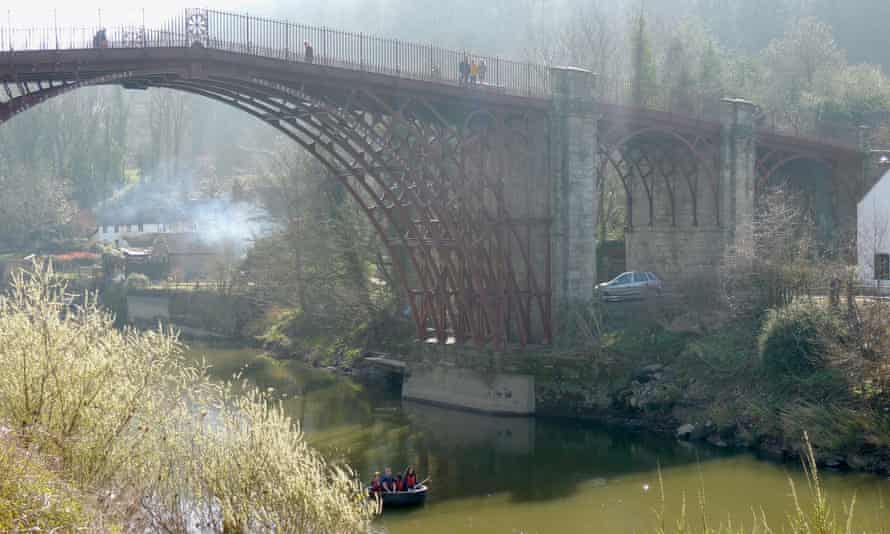
In the 1930s James Hornell published a landmark study of coracles in which he reported seeing them hanging outside every cottage in Ironbridge. We don’t spot any from the water today, but we do pass ancient pubs where cargo deals were once done, old stones scarred by trow-luggers’ ropes and, fittingly, the old coracle shed of Eustace Rogers, a local man whose death in 2003 marked the end of a long line of Ironbridge coracle makers.
The boys want to carry on paddling into the rapids ahead, but instead we leave the coracle, and Nigel, in Jackfield and walk up the riverbank to Coalbrookdale’s Green Wood Centre. This soulful spot, with a community garden and a cafe serving plates of shakshuka and halloumi salads, is where we’re to meet Marion Blockley of the national lottery-funded Ironbridge Coracle Heritage Project. Working with the Ironbridge Coracle Trust, the project aims to promote local coracling culture and heritage. As well as running coracle-making courses, organising an annual coracle regatta each August and hosting coracle try-outs during April-May’s Ironbridge Walking festival, the Trust’s recent work has focused on the New Coracle Shed. It was built in 2020 at the Green Wood Centre, when Rogers’ old coracle shed was deemed unsuitable for public access, and its size belies the breadth of its contents, which include treasured flotsam from Rogers’ shed as well as a community workshop space and a compelling, if tiny, museum.
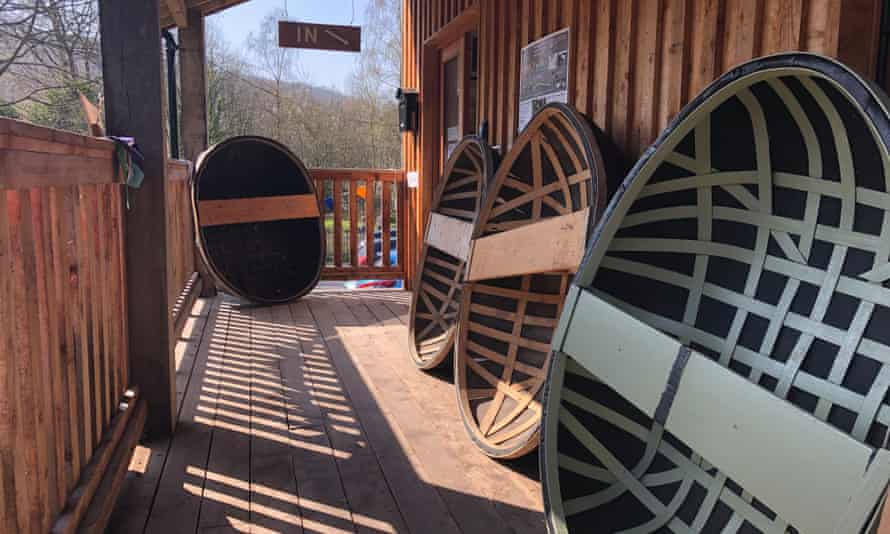
While the boys sit in one of the museum’s coracles, absorbed by local artist Cal Westbrook’s animated story, Colin in a Coracle, Marion tells me there’s been a renewed interest in the boats as people seek out slower pursuits in this digital age. “The craft of making, slowing down, sharing stories, being on the river – that’s what we’re all about,” she says. “We work with refugee groups, young carers, retirees. They paddle out and all the tension releases. It’s a bit like yoga. You find your sense of balance and then you relax. The sense of wellbeing is universal.”
If you know what you’re looking for, Marion says, “you can tell a Welshpool coracle from a Shrewsbury, Ironbridge or Bewdley one. They all have their differences.” We peer at an archetypal Ironbridge one, made by Rogers and painted in glossy green and black, and I wonder what he’d think of our Vietnamese-style craft. I hope he’d be glad that, in 2022, these little boats – in whatever shape or form – are still scuttling back and forth across the river in Ironbridge.
One-hour coracle hire costs from £30 for a two-seater with Shropshire Raft Tours. Entrance to the New Coracle Shed is free (ironbridgecoracles.org). An annual pass to Blists Hill costs £31 adult, £20 child, from £51 for a family, and gives unlimited entry to all the Ironbridge Gorge museums. More information at visitshropshire.co.uk and coraclesociety.org.uk
 Top Naija News: Nigerian News, Breaking News Nigeria and World News Top Naija News is a daily news publication in Nigeria, delivering the latest breaking news in Nigeria and around the world.
Top Naija News: Nigerian News, Breaking News Nigeria and World News Top Naija News is a daily news publication in Nigeria, delivering the latest breaking news in Nigeria and around the world.

